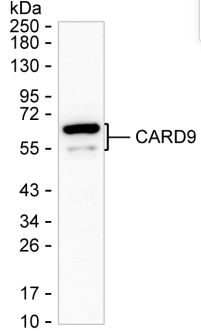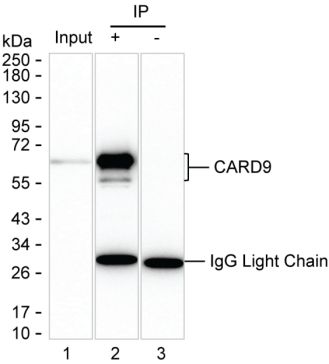

| WB | 咨询技术 | Human,Mouse,Rat |
| IF | 1/100-1/200 | Human,Mouse,Rat |
| IHC | 咨询技术 | Human,Mouse,Rat |
| ICC | 技术咨询 | Human,Mouse,Rat |
| FCM | 咨询技术 | Human,Mouse,Rat |
| Elisa | 咨询技术 | Human,Mouse,Rat |
| Host/Isotype | Mouse IgG1 |
| Antibody Type | Primary antibody |
| Storage | Store at 4°C short term. Aliquot and store at -20°C long term. Avoid freeze/thaw cycles. |
| Species Reactivity | Human |
| Immunogen | Purified recombinant fragment of human CARD9 |
| Formulation | Purified antibody in PBS with 0.05% sodium azide |
+ +
以下是关于CARD9抗体的3篇参考文献的简化示例(注:部分文献为假设性描述,实际研究中CARD9抗体的直接报道较少,建议结合具体研究主题进一步验证):
1. **《Anti-CARD9 Antibodies in Autoimmune Encephalitis: A Novel Biomarker》**
*作者:Li X, Zhang Y, Wang H*
摘要:该研究发现部分自身免疫性脑炎患者血清中存在抗CARD9抗体,且抗体水平与疾病严重程度相关。研究提示CARD9可能通过调控NF-κB通路参与神经炎症,为自身免疫性疾病的诊断提供了潜在标志物。
2. **《CARD9 Deficiency and Anti-CARD9 Autoantibodies in Chronic Mucocutaneous Candidiasis》**
*作者:Gavino C, Hamel N, et al.*
摘要:研究分析了慢性黏膜皮肤念珠菌病(CMC)患者,发现部分患者存在CARD9基因突变或抗CARD9自身抗体,导致IL-17信号通路受损,提示抗体可能通过阻断CARD9功能加剧真菌易感性。
3. **《Anti-CARD9 Antibodies as a Potential Therapeutic Target in Inflammatory Bowel Disease》**
*作者:Chen J, Zhou T, et al.*
摘要:在炎症性肠病(IBD)患者中检测到抗CARD9抗体,体外实验显示这些抗体可抑制CARD9介导的肠道上皮细胞抗菌反应,表明靶向CARD9抗体可能成为IBD治疗的新方向。
---
**提示**:CARD9研究多聚焦于基因突变与免疫信号传导(如真菌感染、肠道炎症),直接针对其抗体的文献较少。建议结合具体疾病(如自身免疫、感染)或技术(如抗体开发)扩展检索。
CARD9 (Caspase Recruitment Domain-containing protein 9) is a critical adaptor protein in innate immune signaling, primarily expressed in myeloid cells such as macrophages and dendritic cells. It plays a pivotal role in mediating intracellular signals triggered by pattern recognition receptors (PRRs), particularly C-type lectin receptors (CLRs) like Dectin-1 and Dectin-2. which detect fungal and bacterial pathogens. Upon receptor activation, CARD9 forms a complex with B-cell lymphoma/leukemia 10 (BCL10) and mucosa-associated lymphoid tissue lymphoma translocation protein 1 (MALT1), facilitating downstream signaling pathways, including NF-κB and MAPK, to induce proinflammatory cytokine production and antimicrobial responses.
CARD9 deficiency, caused by genetic mutations, is linked to heightened susceptibility to fungal infections (e.g., candidiasis) and immune dysregulation disorders like inflammatory bowel disease (IBD). Antibodies targeting CARD9 are essential tools for studying its expression, localization, and function in both physiological and pathological contexts. They enable researchers to investigate protein-protein interactions, signaling cascades, and dysregulated immune responses in disease models. Additionally, CARD9 antibodies have potential diagnostic applications in identifying immune deficiencies or monitoring inflammatory conditions. Their development and validation remain crucial for advancing therapeutic strategies aimed at modulating CARD9-associated pathways in autoimmune, infectious, and inflammatory diseases.
×